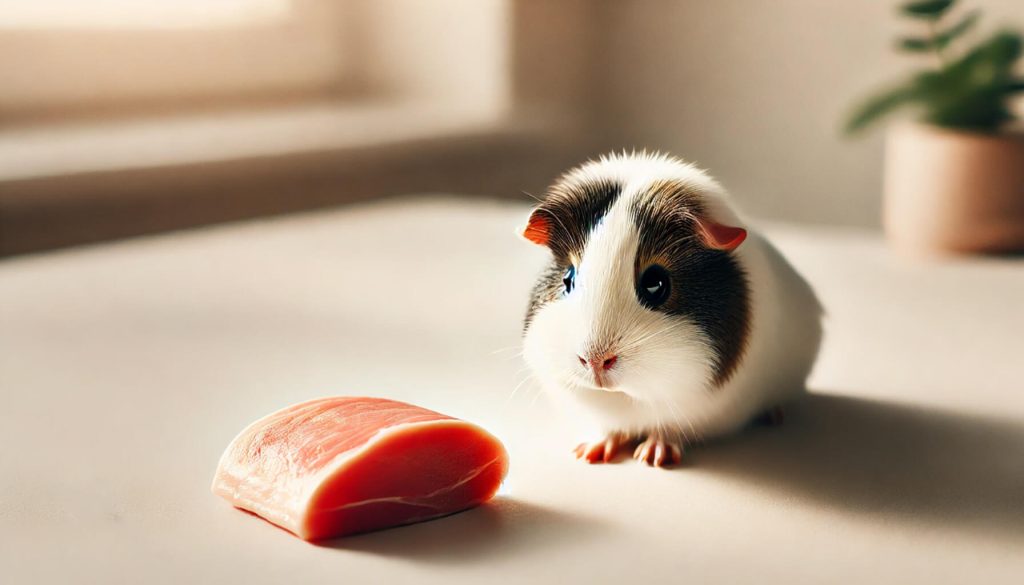
Can Guinea Pigs Eat Pork?
Guinea Pig Diet Basics
Guinea pigs need specific nutrients to thrive. Understand their dietary needs to keep them healthy and happy.
What Do Guinea Pigs Normally Eat?
Guinea pigs primarily eat hay, fresh vegetables, and fortified pellets:
- Hay: Timothy hay or orchard grass are crucial for digestion and dental health.
- Vegetables: Leafy greens like romaine lettuce, bell peppers, and carrots provide vitamins and minerals.
- Fortified Pellets: Commercial guinea pig pellets supplement Vitamin C, which guinea pigs can’t produce on their own.
Avoid feeding guinea pigs dairy, meat, or processed foods, as these can harm their digestive system.
Nutritional Requirements for Guinea Pigs
Guinea pigs require balanced nutrients for overall health:
- Vitamin C: Essential to prevent scurvy, found in bell peppers, parsley, and specially formulated pellets.
- Fiber: Critical for digestion and preventing obesity, available through hay.
- Calcium: Necessary in moderation to prevent urinary stones. Avoid excessive calcium-rich foods like spinach.
Keep fresh water available at all times. Regularly inspect their diet to ensure it meets these nutritional needs.
Can Guinea Pigs Eat Pork?
Guinea pigs must stick to a vegetarian diet. Feeding them pork or any meat can harm their digestive system and overall health.
Risks of Feeding Pork to Guinea Pigs
Pork poses severe health risks to guinea pigs. Their digestive systems aren’t designed to handle meat. Consumption can lead to digestive issues like diarrhea or bloating. Pork contains high levels of fats and proteins that guinea pigs can’t process. This imbalance results in nutritional deficiencies and other health complications. Regular intake could also cause obesity or liver disease, reducing your pet’s lifespan.
Alternatives to Meat for Guinea Pigs
Provide guinea pigs with suitable food options. Focus on fresh vegetables like bell peppers, carrots, and leafy greens. Fruits like apples and strawberries can be given in moderation as treats. Hay should make up the majority of their diet. Timothy hay offers essential nutrients and helps with dental health. Include fortified pellets designed for guinea pigs to ensure they get necessary vitamins and minerals. Always keep fresh water available to maintain hydration.
Safe Foods for Guinea Pigs
A balanced diet is crucial for your guinea pig’s health. Safe food choices ensure they get necessary nutrients without digestive issues.
Recommended Vegetables and Fruits
Vegetables and fruits play a key role in a guinea pig’s diet. Offer leafy greens like romaine lettuce and spinach. Carrots, bell peppers, and celery are also safe. Fruits should be given sparingly due to sugar content. Good fruit choices include apples (no seeds), strawberries, and blueberries. Always wash produce thoroughly before feeding.
How to Introduce New Foods
Introducing new foods requires gradual changes. Start with small portions to monitor your guinea pig’s reaction. Mix new foods with familiar ones. Observe for any signs of distress or allergic reactions. If adverse effects occur, stop feeding the new item immediately.
Conclusion
Ensuring your guinea pig’s diet is both balanced and appropriate is crucial for their overall health. Stick to a vegetarian diet rich in essential nutrients like Vitamin C, fiber, and calcium. Avoid feeding them pork or any other meat, as it’s not suitable for their digestive systems and can lead to serious health problems. Focus on safe and nutritious food options like romaine lettuce, spinach, and occasional fruits. Always introduce new foods gradually to observe any adverse reactions and maintain your pet’s well-being.
